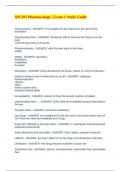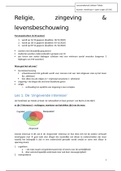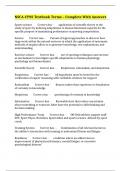Organ Transplantation:
Why do we need people to donate organs?
- Organ failure likely to increase due to ageing population, and rise in conditions related to obesity, and alcohol
consumption.
- Big shortage of organs for transplantation!
o 400 people died while on the active list waiting for transplantation -- but many more removed from list due to
ill health.
Donation in BAME communities:
- Higher rates of hypertension, type 2 diabetes, and certain types of hepatitis = greater need for organ transplant.
- Of 1600 deceased donors, 121 were from black Asian and ethnic minority communities.
- 31% of people on the transplant waiting list are from BAME communities.
- Median wait time for an organ:
o White person: 640 days
o Asian person: 830 days
o Other BAME person: 810 days
o Black person: 965 days
Organ transplantation is successful:
- A year after surgery:
o 98% of kidneys in living donor transplants are still functioning well
o 95% of kidneys from cadaveric transplants are still functioning well
o 94% of liver transplant patients are still alive
o 84% of heart transplant patients are still alive
And Cost Effective!
- Average cost of dialysis: £30,800.
- The cost of a kidney transplant is £17,000 per patient per transplant + £5000 per year for immuno-suppression.
- Over a period of 10 years, a kidney transplant saves the NHS £241,000 = £24,100 per patient per year.
Views on Donation:
- Why do people donate?
o Support the system: give and take
o Make something out of a loss
o Altruism
- Sense of community
- Why don’t people donate?
o Fear
o Religion
o Apathy
o ‘Ick-factor’
Types of Organ Donation:
- Post-mortem (i.e. deceased donor)
o 61% of organ donors
o Around 80% of transplants
- Inter vivos (i.e. living donor
o 39% of organ donors
o Around 20% of transplants
Post-Mortem Donations:
- Two types:
1. Brain death
o Irreversible cessation of cerebral and brain stem function; characterized by absence of electrical activity in the
brain, blood flow to the brain, and brain function as determined by clinical assessment of responses
2. Circulatory death
o Death resulting from the irreversible cessation of circulatory and respiratory function.
What organs can be taken?
- On the organ donor register, you can opt for:
o A: any of my organs and tissue.
- Or
o B: tick which of these you wish to donate:
kidneys
heart
liver
small bowel
eyes
lungs
pancreas
, tissue
New Types of Donation:
- Hand
- Limbs
- Face
- Tongue
- Womb
Is there something different about these types of donation?
- Risk-benefit analysis different as it is not life-saving. But:
o Profound effect on quality of life
o Neither are kidney transplants?
- Difficult to anticipate the long-term physiological and psychological consequences?
o Evidence so far = good.
- Issue caused by social attitudes to disability and disfigurement?
Womb Transplants:
- Should they be publicly funded?
- Risks to foetus of taking immunosuppressants while conceiving/ pregnant.
o If the body rejects the womb, would kill the kid
- What if the transplant fails while pregnant death of foetus.
- Womb transplants only intended to be temporary and then removed. [To enable someone to get pregnant]
o Risky- can this be justified?
When can an organ be removed?
- HUMAN TISSUE ACT (2004)
o Section 1 HTA: permits the removal, storage and use of organs for transplantation from a deceased person as
long as there is ‘appropriate consent’.
o S3(6): this [appropriate consent] can be given by:
1. The donor [signing up to the register, or having said something]
2. The donor’s appointed representative
3. The person in the closest ‘qualifying relationship’
Qualifying Relationships:
1. Spouse, civil partner or partner (defined as ‘live as partners in an enduring family relationship’ (s54(9))).
2. Parent or child;
3. Brother or sister;
4. Grandparent or grandchild;
5. Child of a brother or sister;
6. Stepfather or stepmother;
7. Half-brother or half-sister;
8. Friend of long standing.
- If a child, then the parental guardian + child have to consent
- Family’s don’t have a legal veto if they have made their decisions clear [if they have signed up on the donation register]
o But in practice, hospitals are unlikely to continue with the donation if the family are not in agreement/don’t
consent for publicity reasons [would look bad on the entire donation programme if the family didn’t consent.
The Act was passed within the midst of this situation [children were having their organs donated without their
parents’ consent]
Recipients:
- One organ donor can save 8 lives
- Central allocation [by NHS]
o Waiting list based on need and compatibility [best tissue match, or similar ages]
Need to weigh this up between need and compatability.
Reforming the law on organ donation:
- 1. Organ Donation Taskforce (ODT) 2008:
o Recommended improved coordination not a change in the law.
Make donation usual, not unusual.
Removing bureaucracy e.g. having local level operators
Alternative Models:
- Opt-in
- Mandated choice
o Doesn’t mean that you have to do either one, but everyone has to decide.
This ensures that people don’t sign up because of apathy not very interventionist
- Opt-out 22 countries have this.
o Human Transplantation (Wales) Act 2013
Studies show that people would be in favour. Apathetic people will have their organs given.
Question: is tacit consent equal to active consent?
Can we ensure that the public is informed enough to know that they are automatically on this
list?












